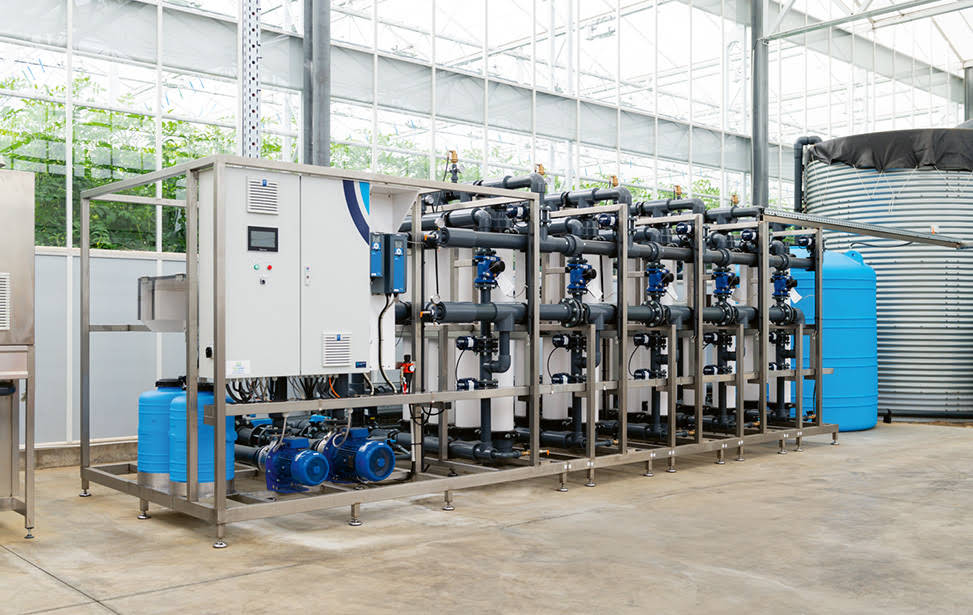- English

When the ECA unit at tomato cultivation company VW Maxburg in Hoogstraten broke down at the end of 2022, immediate action was needed. “Especially in the current situation with a high virus pressure, there was a moment of panic,” recalls co-owner Mitch Vermeiren. Repairing the water disinfection system would have been costly. Operational costs were already high.
That is why the decision was made to opt for a new technology: ultrafiltration disinfection with Kathari from Van der Ende Group. Their ‘house supplier’, Hortiplan made the recommendation to switch. As the project progressed, the decision was made to also filter the basin water, making the challenge even greater.
The Kathari has now been in operation for over six months at the company which is one of Belgium’s larger tomato growers. They are satisfied with the results. Mitch Vermeiren explains on a sunny summer afternoon, “We have taken water samples, and before disinfection, virus particles were detected, but after disinfection, they are no longer detectable. That’s impressive.” In Hoogstraten, VW Maxburg cultivates loose tomatoes on an area of ten hectares.
Ultrafiltration wasn’t even considered in horticulture until a year ago. Mitch says, “Ultrafiltration is still relatively new in horticulture, especially in Belgium. We were willing to invest in this filtration technology, but only with the assurance that it effectively filters out viruses, bacteria, and fungi. Van der Ende Group was able to provide us with a few tests that gave us the confidence it does. Moreover, repairing the current system would cost a lot of money, the technology is not very reliable, and operational costs are high.”
Proprietary Ultrafiltration Concept
The system in question is Kathari, a proprietary ultrafiltration concept that can handle drain, surface, and basin water. It retains nutrients while removing pathogens. An additional benefit is that the operational costs are very low. Tomato Master, coincidentally another tomato Belgian grower located in Deinze, made the same investment a few months earlier and was satisfied. Eric Scheers, Technical Sales Representative at Hortiplan and house installer for both tomato growers, says, “For us, these were the first two UF installations. We also had little experience with UF. However, Van der Ende Group has been a loyal supplier to us for pumps, water treatment, and climate systems for many years. That’s why we had confidence in this new technology.”
Urgent Action Required
Due to the urgency – there were crops in the greenhouse, and reusing drain water was temporarily not an option – quick action was required. Project leader Guus van Dijk from Van der Ende Group explains, “It was a large project, and we had to be prepared for challenges.” To make things even more interesting, when the first order for a Kathari with a capacity of 30 cubic meters was almost signed, the client decided to disinfect basin water as well, increasing the capacity to over 70 cubic meters. For this, the second-largest model (UF20) had to be assembled, which could handle both drain and basin water perfectly. Mitch says, “The cleaner the water, the better it is for the tomatoes. In a basin, you always have organic pollution, and you ultimately risk particles of viruses, bacteria, algae, and so on. By filtering that water as well, we now have clean source water.”
Close Collaboration with Hortiplan
Both Hortiplan, the installer, and Van der Ende Group, the supplier, entered a hectic period. Guus says, “I had intensive contact with Hortiplan. We had questions about both the mechanical connections and the electrical implementation and control. Also, how do we install the system? We went to the location several times with all parties involved, and we had many video calls in between to ensure smooth processes. Both the installer and the supplier were very closely involved.”
Extra Support from Van der Ende Group
Eric adds, “We asked Van der Ende Group for extra support in the sales process, and we received it. We had Van der Ende Group explain all installation-related information and how the system works. Our part was the implementation into the existing installation. We jointly designed the entire path, circuit, and all pipelines. We exchanged a lot of ideas until we concluded: this is how it will be.”
Full Project Timeline
It was a challenging process in Maasdijk, but the deadline was met. Guus says, “We always aim to deliver between eight and twelve weeks, no matter how many projects are running. That time is needed for the entire project timeline. Once the order is in, we can start engineering, but we are also dependent on material delivery times. And with a large installation like this, there are a lot of materials involved.”
Commissioning
The commissioning of the system was a joint effort between Hortiplan and Van der Ende Group. Hortiplan was responsible for the physical installation, while Van der Ende Group handled the fine-tuning and calibration. Guus explains, “One of my colleagues visited the site for commissioning. Once the system is operational, we start monitoring it. We can remotely monitor the performance because the Kathari is connected to the internet. This results in improved and fast remote support.”
Water analyses by Van der Ende Group confirmed the proper operation of the system. Guus says, “Analyzing is customary for us. Two growers can both have tomatoes, but no water flow is the same. That’s why it’s important for us to have insight into the parameters of water quality.”
Good communication among themselves
As the installer, Hortiplan, also expresses satisfaction with the project. Eric says, “It was quite a sales process, but with a good result. Mitch gave us feedback that he is very satisfied: the project went well, everything was neatly installed and fully operational. This was our second Kathari ultrafiltration installation. All our efforts paid off. There were a few issues, but they were quickly resolved thanks to good communication among all parties. Ultimately, we all benefited from that.”